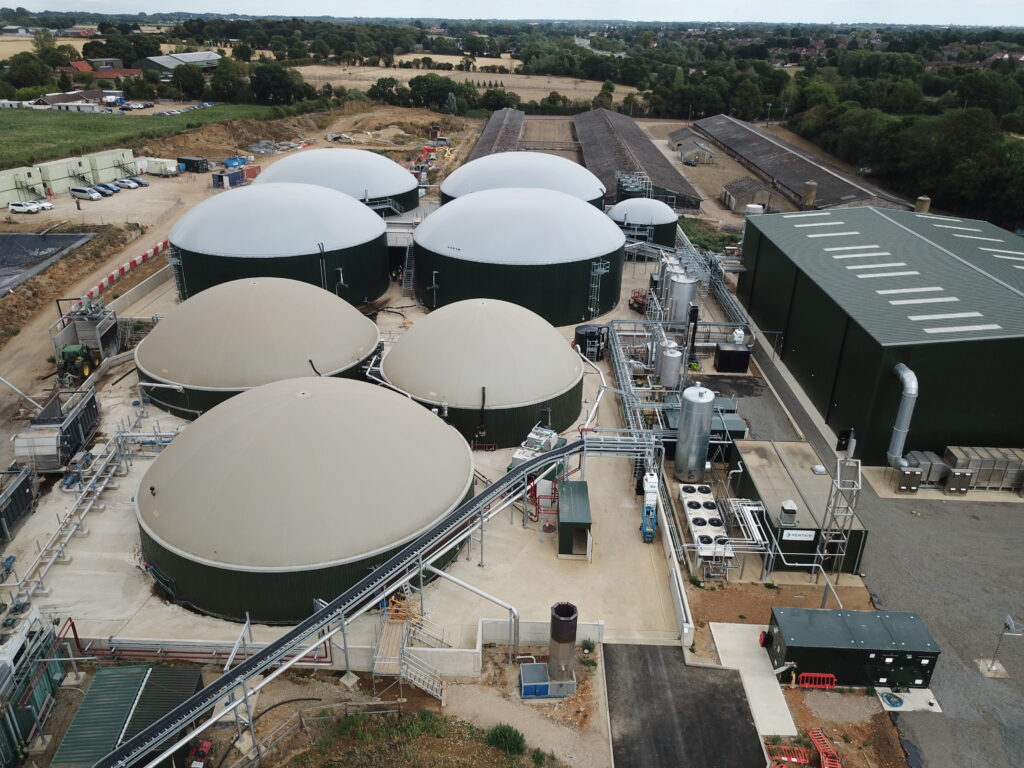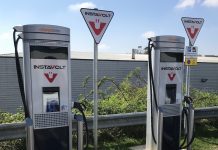Although public awareness of renewable energy is high, with 94% and 79% of people feeling positively or neutrally towards solar[1] and onshore wind[2] respectively; in comparison, very little is known about anaerobic digestion (AD).
Currently, while all the main political parties mention renewable energy in their manifestos, none of them mention AD as a standalone technology at all.
This is despite the technology being widely deployed across the UK, converting waste that would otherwise go to landfill into electricity and green gas; and having the potential to produce 5.7 billion m3 per year of biogas – enough to heat 5.5 million homes.[3]
According to two industry experts, it is due to a widescale lack of awareness that the technology is overlooked in policy, impacting investment and therefore leading to an untapped opportunity within the UK’s climate strategy.
 Sara Bartle (right), green gas and hydrogen policy lead at The Association for Renewable Energy and Clean Technology (REA), explains although AD may not be as popular as other renewable technologies, it has a key part to play in helping the UK to reach its net zero targets by 2050.
Sara Bartle (right), green gas and hydrogen policy lead at The Association for Renewable Energy and Clean Technology (REA), explains although AD may not be as popular as other renewable technologies, it has a key part to play in helping the UK to reach its net zero targets by 2050.
“Biomethane contributes to renewable heat and transport targets, as it can replace natural gas across multiple end-use sectors via grid injection or bottling as a vehicle fuel,” she says.
“AD plays an important part in decarbonising the gas grid, as biomethane is currently one of the only ways to replace fossil fuels for heating homes, industries and for transport fuels.”

Chris Winward (right), chief executive officer at Privilege Finance, a specialist funder in climate change mitigation projects, agrees that the UK should make better use of the technology.
“After the Russia-Ukraine conflict, it’s become increasingly clear that we have to secure the UK’s energy security in terms of supply, which will in turn impact price,” he says.
“Reducing reliance on imported fossil fuels while providing a balanced and diversified energy mix should be a key consideration – and AD can provide all of these things.”
Mr Winward stresses while AD has struggled to gain popularity under the current Conversative government, he is hopeful that the upcoming election will reverse this trend.
“The reasons why AD has been left out of the renewable energy mix are complex, but I think that the number one reason it’s underappreciated is because of a lack of education around the benefits the technology can bring,” he says.
“The idea of using waste to create energy can make some people uneasy, as opposed to wind and solar which are seen as being ‘clean’.
“This misunderstanding can also make the planning process more difficult. Some individuals don’t want AD in their backyards purely because of misconceptions, rather than facts.”
Mr Winward says a lack of long-term policy and planning has led to an inability to attract long-term investment.
“The Green Gas Support Scheme, which provides financial incentives to build new AD plants, has been extended to 2028, which should be a positive.
“However, I doubt that we’ll see any more AD plants built under the remainder of the scheme due to the difficulty in finding a suitable site, as well as the lengthy planning process.
“That’s why we’ve just released our own manifesto – to shine a spotlight on AD and garner support for the technology.”
As head of the REA’s biogas team alongside her other roles, Ms Bartle agrees that AD deserves a bigger role in the UK’s policy making.
“Up to now, government policies in the UK have favoured large-scale offshore wind development over onshore alternatives like AD, mainly due to concerns about land use and the out of sight, out of mind factor,” she says.
“There’s also a perception that electricity generated from wind and solar are somehow cleaner and easier to integrate into the existing power infrastructure. This is just not accurate.”
With the upcoming election in mind, Ms Bartle is keen to see a broad range of renewable technologies considered in long-term policy.
“As a trade association, we will push for support for all renewable industries with political parties,” she says.
“We will be analysing and responding to party manifestos as they are published, and we will actively monitor other organisations’ manifestos to find common ground and develop a strong, unified voice across the clean energy sector.”
Regardless of which party wins the election, Mr Winward is certain that the UK’s future energy mix will include green gas from AD.
“I’m hopeful that we’ll see more engagement with AD from the top down, so we can focus on attracting investment to the sector, and supporting the country’s emission reduction goals,” he says.
To find out more about the REA’s work in promoting biogas production, please click here.
To read more about Privilege Finance’s views on the future of AD, please click here.
[1] Solar Energy UK survey shows 61.5% support for solar from those living near sites – Solar Power Portal
[2] Public support for renewable energy reaches new record high – RenewableUK
[3] World Biogas Association (WBA) | Member Press Release (Opinion piece) – Can the UK meet its AD potential?



